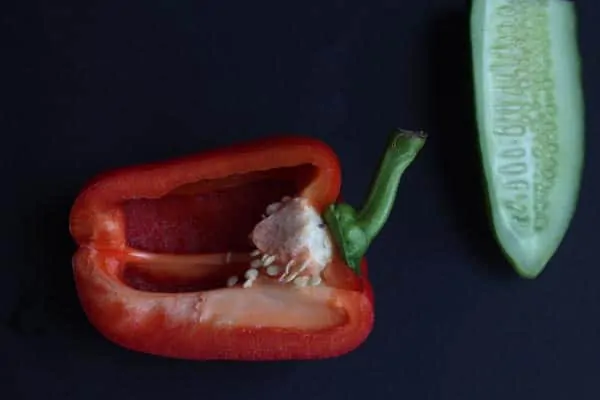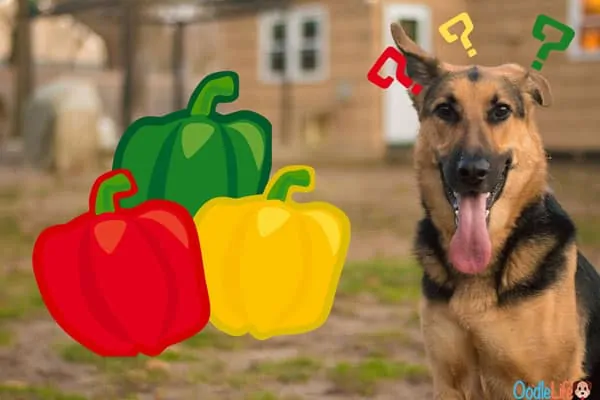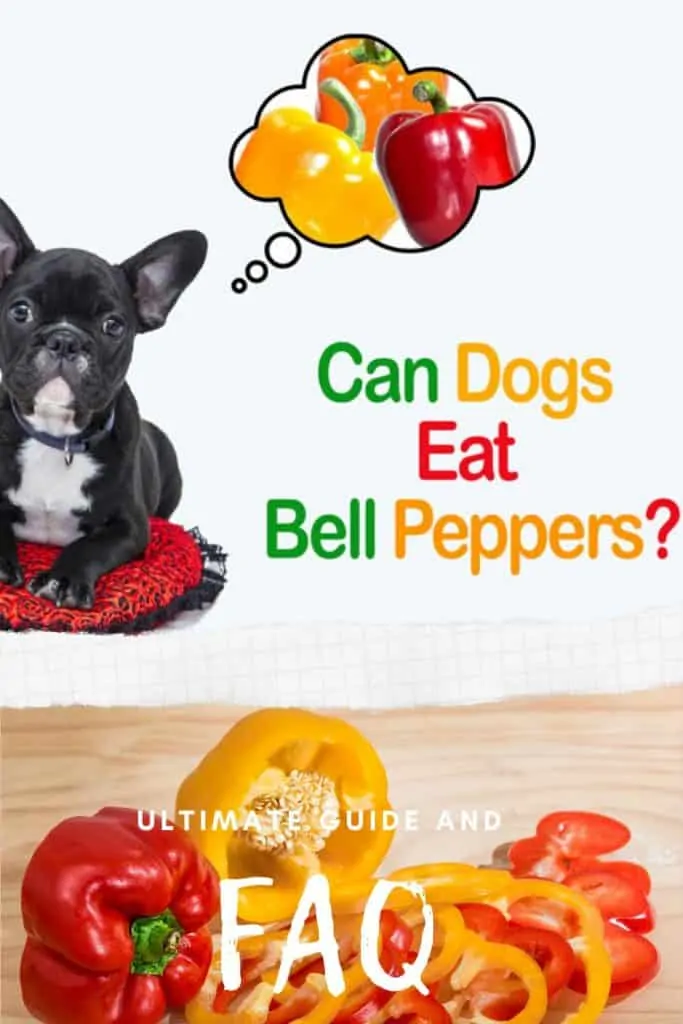Can Dogs Have Bell Peppers? Complete Guide Best Reasons To Feed Capsicum To Your Puppy
Dogs love to eat basically everything. Sometimes they try to sneak food from your plate! In general we should not feed our dogs human prepared food. The main reasons are because we use oils and seasonings that can upset the puppy’s stomach.
There are however human foods that we can feed our dogs in small quantities or as a treat!

So can dogs have bell peppers? Can dogs eat different coloured bell peppers?
Bell Peppers are known by different names around the world. So in the US or Canada, they are known as Bell Peppers. In the UK and Ireland they are often referred to as peppers, or sweet peppers. In other parts of the world Australia, India, New Zealand, Pakistan and Malaysia they are known as capsicums. (Wikipedia) So when we find out how much bell pepper dogs can have, the same advice applies for can dogs have capcisum.
So Can Dogs Have Bell Peppers?
As an owner, you must be mindful of what out-of-the-ordinary foods you feed your dog. It can be difficult to keep track of which foods are dog appropriate.
Vegetables like the Bell Pepper are generally healthy and are okay to be eaten by dogs. Regardless of colour, standard Bell Peppers can be given to your puppy.
Fresh Bell Peppers are crunchy, high fibre snacks that are packed with beta-carotene and other great vitamins. You can use small amounts of bell peppers as snacks or nutritious treats for your dog.
Chewing fibrous vegetables can even clean the teeth of your dog. Though a crunchier vegetable like a carrot may be more effective for this.
What Type of Bell Peppers Can a Dog Have?
Puppies and dogs can have
- Green Bell Peppers
- Red Bell Peppers
- Yellow Bell Peppers
- Orange Bell Peppers
- Capsicum
- Sweet Peppers
- Home-grown Bell peppers
- Hydroponic bell peppers
If the bell pepper is not spicy in any way then the dog is ok to have that bell pepper. This means that the “ok to eat” does NOT extend to any spicy peppers or chilli.

Make sure that the bell peppers are thoroughly washed or peeled to remove all dirt and pesticides. This includes home-grown bell peppers even if you are fairly sure there was no pesticides or chemicals.
Remove the seeds and stems BEFORE feeding bell peppers to your dog.
Can Dogs Have Bell Peppers YouTube Video
How To Feed Bell Peppers To Puppies and Dogs
The simplest way to feed a dog bell peppers is to chop the vegetable and have it raw. Small sizes that are not choking hazards are recommended.
Depending on the size if your dog, the shape you chop will change. For extra small dogs (like the super tiny toy Goldendoodle) you will need to consider the bell pepper as a choking hazard.
Some dogs like to play with strips of vegetables like capsicum or peppers, and the treat will be healthy AND keep them entertained. Anything that keeps the dog mentally stimulated while healthy is a great thing!
If your dog does not like chewing the bell pepper but you definitely want to feed it to them, you can try
- Steam
- Blitz and mix with kibble
- Shred
Remember that Bell peppers are fun treats but are not an essential part of a dog diet.
All treats should make up less than 10% of a dogs diet. Keep a track of all treats over the course of the day. Do not be caught out over feeding your dog – even with a healthy snack!

Can A Dog Eat Stir Fry Vegetables Like Bell Peppers?
Your dog should not be given any oiled or seasoned Bell Peppers. This goes for stir fry vegetables of any type. The oil and seasoning can upset their stomach for dogs of any age.
Some dogs are iron guts and love a treat from the human plate – but it is wise to limit this as much as possible. Oils and seasonings are not designed for dog consumption.
Do Vitamins and Vegetables Help My Dog Be Healthier?
Bell Peppers are healthy for humans because they contain Vitamins A, C, E and antioxidants. Like carrots, they contain beta-carotene.
These vitamins will not help your dog see in the dark or develop laser eyesight. It is known that such vitamins can have benefits for dog health. Specifically, a diet that is rich in vitamins and minerals is likely to have a shinier healthier coat.
If your dog was deficient in a vitamin from their base diet, supplementing with vegetables may see an uptick in overall health. However – you need to take a long hard look at the base dog diet if this is the case.
Dogs should not have to rely on supplementation to achieve vitamin and mineral goals. So no need to line up super berries, fruits, or vegetables for your dog.
Are There Reasons My Dog Should Have Bell Peppers?
There are two positive reasons why a dog diet that has very small amounts of vegetables in lieu of other treats can be positive.
Firstly, the fibre present may result in better digestive health. If introducing healthy low calorie vegetables sees an improvement in your dogs pooping, you need to consider modifying your dogs diet. They should not have to rely on fibre from snacks to regulate bowel movements.
Secondly, as a treat – small amounts of vegetables are a great strategy to minimise pet obesity.
A whopping 56% of dogs are overweight according to statistics from the Association of Pet Obesity Prevention.
A snack like bell peppers does not contribute much at all to the calorie intake for dogs. By avoiding calories in treats, you can help your dog maintain the correct weight. Their health will be greatly improved by your cautious and caring feeding.

Frequently Asked Questions
Can Dogs Eat Bell Peppers?
Can dogs have green bell peppers?
Can Dogs eat orange bell peppers?
Can My Dog eat Bell Peppers
What To Do If Your Dog Eats Bell Peppers
Conclusions
Red, green, yellow and orange bell peppers CAN be eaten safely by dogs. It is great to know that dogs can have bell peppers.
Unlike their wolf ancestors, puppies and dogs can break down carbohydrates like those found in bell peppers.
Vegetables are not essential and are not required as part of a healthy dog diet.
If you have leftover capsicum or peppers next time you cook (making tacos or burritos anyone?! Yum) – you can feel safe feeding the peppers to your dog.
Can dogs have bell peppers?
- There are no negative health effects in small volumes
- You can minimise food waste
- Some dogs love to play with the crunchy and different snack
- As a replacement for calorie rich snacks
- If a dog eats like… a LOT of mulberries how worried should I be?
- What about a dog that steals a WHEEL of brie cheese from a paltter?
- My Dog Ate Fish Food [Should I Be Worried?]
- Do dogs eat OTHER dogs?